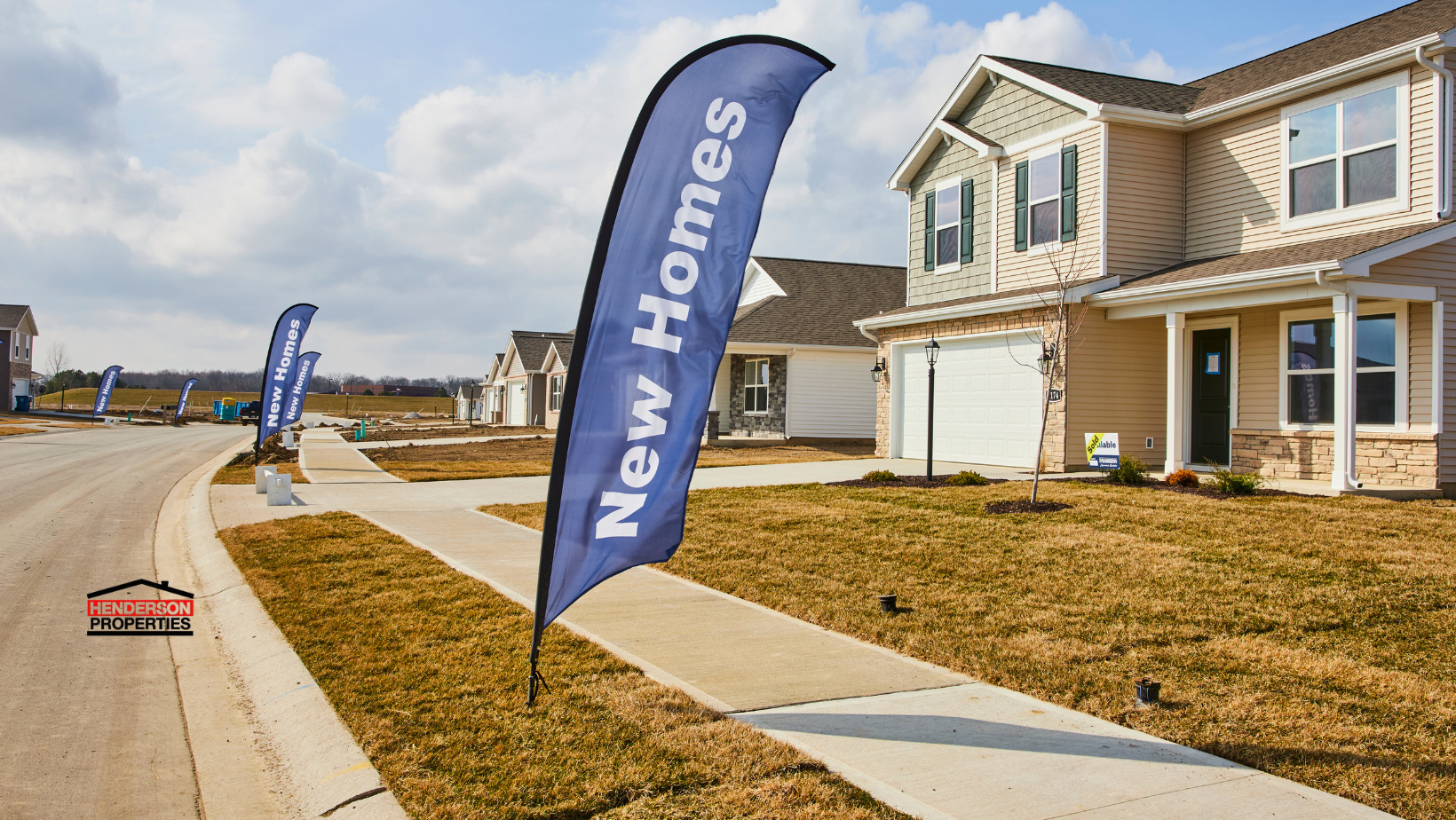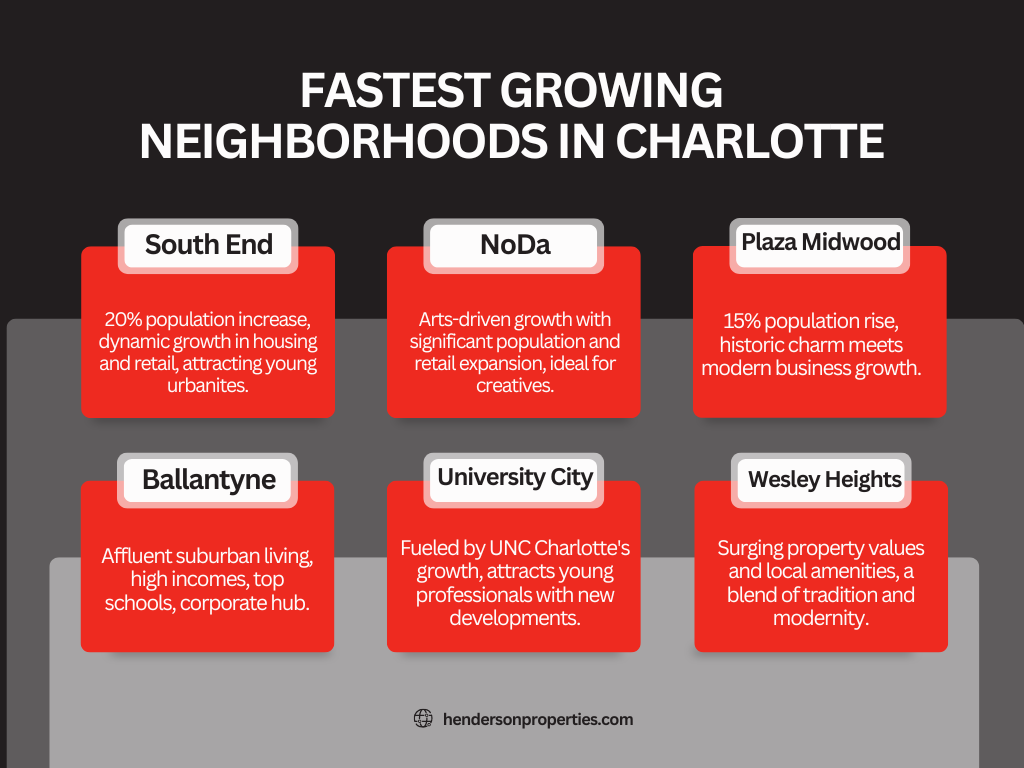- Walk-in Traffic is by Appointment Only - More Details
Local Investor’s Guide to Residential vs. Commercial Real Estate in Charlotte

Complete Seasonal Maintenance Checklist for Charlotte Rentals
May 2, 2025
The Future of Charlotte Real Estate
May 5, 2025Should You Go Residential or Commercial?
Charlotte isn’t just growing, it’s accelerating. With one of the fastest-growing populations in the country, a thriving job market, and a reputation as the Southeast’s financial and logistics powerhouse, it’s no surprise that real estate investors are paying close attention.
But in a booming market like Charlotte, the real question isn’t if you should invest, it’s how. Should you start with residential rental properties or explore commercial spaces like offices, warehouses, or retail storefronts?
In this guide, we’ll explain the real differences between residential and commercial property investing in Charlotte. We’ll explore returns, risks, management intensity, and neighborhood trends, giving you a local perspective to help shape a profitable investment strategy.
Why Charlotte’s Market Is Built for Opportunity
Charlotte is the second-largest banking center in the country and home to an increasingly diverse economy. Major employers like Bank of America, Truist, Wells Fargo, Honeywell, and Atrium Health call Charlotte home, and the region continues to attract technology, logistics, and manufacturing firms looking for affordable growth space.
More than 100 people move to the Charlotte metro every day. That means more housing demand and more business activity. Rental housing is needed for relocating professionals and families, while new retail, medical, and warehouse space supports the businesses moving in to serve them.
As an investor, this combination creates a rare opportunity: you can ride both residential and commercial waves, and in some cases, they intersect. But each path comes with distinct considerations.
Residential Rentals
For many investors, residential rentals are the natural first step into real estate. They’re familiar, relatively easy to finance, and highly responsive to local population growth, and Charlotte checks all the right boxes.
The region’s housing demand remains strong, from modern apartments in SouthEnd to single-family homes in Fort Mill or Matthews. Average rents continue to rise, and most well-priced homes lease quickly. Residential real estate offers an appealing mix of stability and opportunity for those looking for a manageable, income-producing investment.
Here’s why Charlotte’s residential rental market stands out:
- Strong tenant demand from young professionals and families and relocating residents keep vacancy rates low across the metro.
- Accessible financing for 1–4 unit properties makes it easier for new investors to start.
- High occupancy and fast turnover mean properties often lease within days in sought-after neighborhoods.
- 12-month leases create predictable income, though investors should expect more frequent tenant turnover and occasional maintenance needs.
- Consistent population growth ensures a reliable pipeline of renters, even if one moves out, another is likely ready to move in.
Commercial Properties
Unlike residential rentals, commercial properties involve leasing to businesses, such as retail storefronts, medical offices, distribution centers, and professional service firms. In Charlotte, rapid suburban expansion, e-commerce logistics, and a growing corporate presence are fueled by commercial demand.
Neighborhoods like SouthEnd, Ballantyne, University City, and the Airport Corridor have become prime targets for commercial investment. Businesses are drawn to these areas for their visibility, accessibility, and access to Charlotte’s growing customer base.
Commercial real estate offers exciting income potential but has higher risk and operational complexity.
Here’s what investors need to know:
- Commercial leases tend to be longer-term, often 3–10 years, providing more income stability when tenants are secured.
- Cap rates are typically higher than residential properties, especially in industrial and neighborhood retail sectors, leading to stronger potential returns.
- Triple-net leases (NNN) are common, shifting property expenses like taxes and maintenance to the tenant and increasing net income.
- Vacancies can be long and costly, particularly in sectors like office space, where build-out costs and tenant search timelines can drag on.
- Managing commercial assets is more complex, requiring an understanding of zoning laws, lease negotiations, and infrastructure demands that vary by business type.
Hands-On vs. Hands-Off Investing
Another key difference between residential and commercial properties lies in day-to-day involvement.
Residential properties, especially single-family rentals or duplexes, may require more frequent touchpoints to handle repairs, coordinate turnovers, or address tenant concerns. That said, these tasks are often routine and can be outsourced to a trusted local property manager. In fact, many Charlotte landlords use companies like Henderson Properties to handle everything from leasing to maintenance coordination.
Commercial properties, by contrast, can be more “hands-off” during stable periods, especially if you have long-term tenants under triple-net leases. But the upfront management is heavier. Lease structuring, tenant negotiations, and property condition assessments all require experience or expert support. Commercial owners usually work with specialized management firms or leasing brokers to handle the operational complexity.
Residential may be your style if you prefer simplicity and a steady cadence. Commercial could be a rewarding challenge if you’re comfortable managing complexity in exchange for bigger payouts.
Local Neighborhoods That Align with Investment Goals
Charlotte’s submarkets aren’t created equal, and knowing where to invest matters as much as what to invest in.
For residential, high-demand neighborhoods like South End, NoDa, and Plaza Midwood attract renters seeking lifestyle, walkability, and proximity to Uptown. Suburbs like Fort Mill, Huntersville, and Indian Trail draw families looking for space and school quality, making single-family rentals a strong play.
For commercial, opportunity often follows infrastructure and traffic. The Airport Corridor is a hotspot for industrial investment, while South End and Dilworth continue to attract boutique offices and ground-level retail. Areas like Ballantyne and SouthPark are hubs for professional services and medical offices. At the same time, University City remains strong for flex office and research space thanks to the university and growing job base.
What’s Feasible Based on Your Capital?
Another major factor to weigh is financing.
Residential properties are often easier to purchase, particularly for first-time investors. Traditional 30-year mortgages with competitive rates are available for most 1–4 unit properties. You can start small and build from there, purchasing your first rental with 20–25% down and then expanding as you build equity.
Commercial deals typically require larger down payments, shorter loan terms, and stricter underwriting. Lenders often evaluate the building’s income-producing potential, not just your credit or assets. That means more capital is needed up front, but it also opens the door to scaling faster, especially when dealing with higher-value leases and multi-tenant properties.
If you’re starting with limited capital or want more predictable lending terms, residential may be the better fit. Commercial could be your path to faster growth if you’re well-capitalized and aiming for bigger cash flow potential.
Hybrid Portfolios for Balanced Growth
In Charlotte’s dynamic real estate market, some of the savviest investors aren’t picking sides; they’re diversifying across both residential and commercial properties. By building a hybrid portfolio, they’re creating a strategy that captures the stability of residential income and the higher returns of commercial deals.
This blended approach offers several benefits that can help investors weather market shifts and scale smarter:
- Single-family homes or small multifamily rentals provide steady monthly income and are usually easier to lease quickly in Charlotte’s high-demand neighborhoods.
- Commercial properties like warehouses or retail strips offer stronger cap rates and long-term leases, generating bigger cash flow over time.
- Diversification reduces risk—if one property type slows down or sits vacant, the others help balance income and performance.
- Charlotte’s mixed economy and regional growth support both strategies, from young renters in SouthEnd to logistics operators near the airport.
Which Path Is Right for You?
There’s no one-size-fits-all answer. The best investment type in Charlotte depends on your goals, experience level, capital, and appetite for involvement.
Residential real estate offers accessibility, consistency, and relatively low risk, making it a strong choice for new investors or those building slow, steady wealth.
Commercial real estate offers higher income potential and greater scalability but comes with added complexity and risk. It’s often the next step for investors ready to grow their portfolio or leverage market trends in areas like logistics, retail, or healthcare.
Charlotte offers an environment where smart, informed investments can thrive, whichever path you choose.
Let’s Talk Strategy
At Henderson Properties, we help local and out-of-town investors make confident, strategic decisions, whether you’re just starting with residential rentals or ready to explore commercial opportunities.
With expert property management, leasing support, and investment insights tailored to the Charlotte market, our team is here to help you grow.
Contact Henderson Properties to learn how we can support your next investment move.








